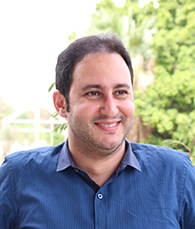"Be part of the plan" | International Day for Biological Diversity - May 22
Biological wealth: a precious treasure to protect

Mr Omar ENNAIFER
Biologist specializing in Evolution, Ecology and Environment,
Sahara and Sahel Observatory
You may call it biological wealth or biodiversity. This living patchwork where beings and ecosystems intertwine, is a priceless treasure that supports our very existence. From the air we breathe to the water we drink and the food we eat, it stands behind the regulation of the climate, the protection of the soil and the pollination of crops. It is also the foundation of our economy as it powers vital sectors such as agriculture, tourism and healthcare.
Celebrated on May 22 of each year, the International Day for Biological Diversity is a constant reminder of the crucial importance of preserving the richness of life on Earth. This year's theme, "Be part of the plan", is a call to think about the actions that everyone can take to safeguard this exceptional wealth. Today, it is indispensable to unite and actively engage in protecting ecosystems, promoting biodiversity, and building a sustainable future for the planet.
Deforestation, pollution and overfishing are just a few examples of human activities that are weakening our planet. The level these activities have reached is putting an alarming threat on biodiversity and the habitats, to the extent that the sixth great mass extinction is to be taken very seriously. Furthermore, the climate change effects are exacerbating the depletion of natural resources and the degradation of ecosystem services, making it even more pressing and necessary to act and protect biological wealth and avoid serious and lasting disorders to our species and life on our planet.
But despite this bleak picture and worrying situation, there is still room for hope and it is not yet too late to reverse the trend. Concrete measures have been taken at all levels to put a halt to the decline of biodiversity and preserve this invaluable treasure.
Indeed, the UN Convention on Biological Diversity (CBD), adopted in 1992, aims at preserving biological wealth, encouraging the sustainable use of its components and fairly and equitably distributing the benefits of the genetic resources use. In addition, Sustainable Development Goals (SDGs), adopted by the United Nations in 2015, namely Goal 15, aim at "protecting, restoring and promoting the sustainable use of terrestrial ecosystems, sustainably managing forests, combating desertification, stopping and reversing land degradation and halting the loss of biodiversity ." We must not forget the Paris Agreement on climate change, also adopted in 2015, which recognizes the importance of preserving biological wealth in the fight against climate change and which encourages the consideration of biodiversity in national action plans.
At the national and local level, efforts complement and implement international initiatives through concrete policies and actions that come to protect natural habitats and endangered species and promote sustainable practices. Conservation areas and sanctuaries have increasingly been created to protect natural habitats and the species that live therein. Also, there have been laws to strengthen the fight against poaching inside and outside these spaces. Many measures for reduced air, water and soil pollution have been adopted, thus contributing to the restoration of degraded natural habitats. Furthermore, environmentally friendly practices, such as sustainable agriculture and fishing are encouraged, in order to keep sustainably exploiting natural resources and benefiting from them.
The financing mechanisms are also a key player that make it possible for all efforts to come to fruition. Thus, the Global Environment Facility (GEF), created in 1991, supports initiatives to preserve biological wealth. It also established the Global Biodiversity Framework Fund (GBFF) to help countries achieve the Kunming-Montreal Global Biodiversity Framework objectives. The GBFF was ratified by 186 countries and launched at the 7th GEF assembly in Vancouver, Canada, in August 2023. Brazil, Gabon and Mexico were the first countries to benefit from such a Framework.
International and regional Organizations also play a key role in preserving biodiversity by supporting national and local actors. The Sahara and Sahel Observatory (OSS), an African-vocation Organization, has worked for more than 30 years to preserve biological wealth and human heritage in Africa. Aware of the crucial importance of biodiversity, it has integrated this priority into its 2030 strategy, paying particular attention to it in all its activities. For its vision to be achieved, the OSS created the Land and Biodiversity Department which it dedicated to the protection and conservation of biodiversity. For this to happen, the OSS was one of the very first entities to establish networks for the exchange of information and data, thereby contributing to ecosystem natural capital accounting in support of biological diversity in Africa.
On this International Day for Biological Diversity, it is imperative that we all commit to helping protect this precious treasure. Let us not forget that every single step counts and that together, we can “Be part of the plan” for the preservation of biodiversity and build a sustainable future for the planet and for all its inhabitants.